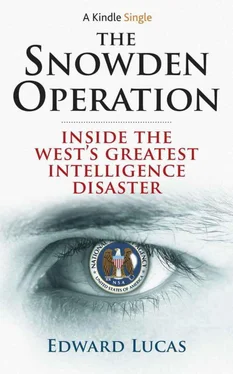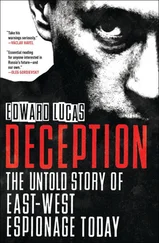Arbitrary power is the great grievance of the Snowden camp. Who gave the NSA and GCHQ the power to bug and snoop? The real answer to that is simple: the elected governments and leaders of those countries, the judges and lawmakers who have the constitutional authority to supervise intelligence services, and the directors of the agencies in the exercise of their lawful powers. You may not like the system. You may think it needs improving (I do). But never in the history of intelligence has supervision been stronger. America in particular stands out as a country that has taken the most elusive and lawless part of government and crammed it into a system of legislative and judicial oversight. Greenwald simply dismisses such arrangements. For those in search of reform, he argues, ‘the answer definitely does not lie in the typical processes of democratic accountability that we are all taught to respect’. [58] https://github.com/poppingtonic/greenwald-30c3-keynote/blob/master/transcript/transcript.md
Instead, he thinks the answer lies in international pressure on America. Shame and destruction, not votes, laws and institutions, bring about reform.
The question about arbitrary power actually deserves to be posed in the other direction. What constitutional authority do the Guardian , Der Spiegel or the New York Times have? What gives them the right to leak their countries’ most closely guarded secrets, obtained at vast expense, and with the sacrifice of tens of thousands of man-hours? Even the most passionate defenders of press freedom would hesitate to say that editors are the supreme guardians of the national interest. And even the most self-important editor would hesitate to claim omniscience. What expertise do editors and journalists have in handling these stolen secrets? How can they judge that a particular programme is worthy of exposure (rendering it useless overnight and perhaps endangering those who have worked on it) and that another can be spared the glare of publicity, at least for now and possibly ever?
The publication of secret documents, without context or challenge, has a pernicious effect on the debate that follows. As Inkster, the former British spymaster now at the International Institute for Strategic Studies in London, points out:
Not even the NSA knows for certain how much information Snowden actually stole. It is clear, however, that he could not possibly have read more than a fraction of this material. It is equally clear that he did not understand the significance of much of the material he did read and that the same was true for the newspapers that published it. The resulting confusion and misapprehensions that have taken hold within the media and shaped the public debate about the NSA’s bulk collection activities have not been effectively challenged or rebutted by the US and UK governments for various reasons, chief among which has been a desire not to create a damaging precedent by responding to specific allegations regarding the activities of their intelligence agencies. [59] Inkster, see n10, above
As far as can be inferred from Greenwald’s public statements (he declined to respond to my requests for comment), his main aim is to make a splash. Asked how he chooses which material to release, and which to withhold, he answered:
We chose certain information we wouldn’t disclose, eg what would help other states improve their surveillance, or anything that NSA has gathered about people (that would do the NSA’s dirty work) or anything that would endanger the lives of innocent human beings. We want to publish in a way that will create the most powerful debate and greatest level of recognition. [60] Hamburg speech: https://www.youtube.com/watch?feature=player_embedded&v=xEJIR0-KJu0
That is a striking claim. Who is Greenwald to decide who is ‘innocent’ and who is not? Are all employees of the NSA to be counted as ‘guilty’ of engaging in ‘dirty work’? And everyone who cooperates with them? Or only some? And guilty of what? Is Greenwald the judge, jury and executioner of the careers of public servants who have operated within the law, at the behest of elected governments, and under the oversight of courts and lawmakers?
It is only a mild caricature to say that the presumption behind the leaks is that the intelligence agencies in the West are the greatest threat to freedom on the planet. As Inkster argues, ‘for those who regard intelligence services as inherently illegitimate or take the view that the US is the world’s number-one rogue actor, no counter-narrative will ever be convincing’. Such fears may be the basis for a thrilling screenplay in a Hollywood movie, where vast sinister forces are marshalled against a lone hero. But they are a poor guide to real life.
One of the overwhelming impressions left by the leaked documents is, in fact, of a painstaking approach to legality. The spies did not believe that what they wrote would ever become public. Like other bureaucrats, they trumpeted their achievements in the hope of scoring points and winning favour. That comes across sometimes as chirpy or crass. But nothing revealed shows contempt for judicial oversight or a wilful desire to evade it. [61] This training slide exemplifies the law-governed approach, showing exactly what NSA officials should do if and when they come across Americans’ data: http://apps.washingtonpost.com/g/page/national/whats-a-violation/391
The NSA and other agencies do try to work out what the maximum is that they can do within the limits of the law. In some cases, they overstep the mark and get slapped down, sometimes crossly, by the FISC or Congress; moreover, individual officers of the agencies may knowingly break the rules. But the fact that these breaches were recorded in internal agency documents (and in the case of individual wrongdoing, disciplined) bespeaks adherence to procedure, not a cover-up.
Moreover, to err is human: bureaucratic self-aggrandisement is common in other branches of government too. Police officers sometimes intimidate suspects, fake evidence or beat up protestors. Soldiers haze new recruits or commit war crimes. Teachers and social workers abuse their power. (Even journalists can be crooked, deceitful or brutal.) Intelligence officers make mistakes too. It is true that the powers that the agencies enjoy mean that they must be particularly vigilant against abuse. But the really striking thing about the revelations to date (which are presumably cherry-picked to portray the NSA and its allies in the worst possible light) is the conscientious, tame and bureaucratic approach they reveal. It is true that the FISA court turned down few requests from the NSA. But this does not prove that the court is toothless. It reflects the fact that the NSA itself vets its own requests to weed out those that are unlikely to gain approval.
The recklessness, damage, narcissism, and self-righteousness of the Snowden camp do not invalidate all their aims. A debate on the collection and warehousing of meta-data was overdue. Collected and scrutinised, meta-data can breach privacy: if you know who called a suicide prevention helpline, or an HIV testing service, or a phone-sex line, and from where and when, the content of the calls matter less than the circumstances. These collections of meta-data, it should be noted, are not only vulnerable to abuse by nosy spooks: they are available in colossal amounts to private sector internet companies, some of whom may protect them only lightly and use them with far greater freedom than a bureaucrat.
More importantly in my view, the Obama administration has treated whistleblowers with scandalous harshness, especially those from inside the intelligence community. The hardest point for critics of Snowden is to explain what he should have done with his worries had he chosen to stay within the system. Genuine whistleblowers such as Thomas Drake, a senior NSA analyst, who believed (rightly or wrongly) that they were exposing abuses within the agency, were hounded and prosecuted under laws which would be rightly applied to spies and traitors. They are now strong supporters of Snowden’s chosen course of action.
Читать дальше












